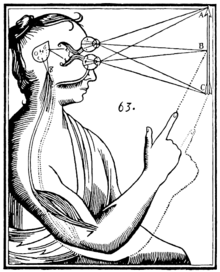Dualism Ditheism | Navigation menu
PhilosophyTheology
ideatheorymonismpluralismphilosophycommon sensetheologyZoroastrianismWiccaMarcionismBibleSatanGodangelEpistle of Judegod
Dualism
Jump to navigation
Jump to search

René Descartes described dualism as follows: The senses capture stimuli, which then reach the pineal gland in the brain. From there, they act upon the mind
Dualism is the idea or theory that something (an object, an idea or the whole world) is split into two parts. These parts are separate from each other, and the thing cannot be divided up in any other way. The idea or theory that something cannot be split into any parts is called monism. The idea that something can be split into many parts is called pluralism.
In philosophy there are many kinds of dualism.
- In the philosophy of mind dualism means that the mind and the body are two very different things. Nothing that is part of the body can be part of the mind and nothing that is part of the mind can be part of the body. People like this sort of dualism because they think that the mind is too important or too strange to be part of the body. Another idea is that the mind and body are the same thing or that mind is just another word for the brain. (See also René Descartes)
- In epistemology, dualism means that there is a barrier between a person and the world around them. This barrier splits the world into two for that person, into 'myself' and 'the world'. Each person can see, hear, taste, smell and touch the world but cannot know it directly. For example, somebody cannot know just by looking that things are made up of many atoms. This means that something could happen in the world that we would not know about because we could not see, hear, taste, smell or touch it. A non-dualist idea is that a person is just another part of the world and that there is no barrier. For example, it could be said that if somebody cannot see, hear, taste, touch or smell something then it does not affect them.
Dualism is also a common sense idea. For example, it is a form of dualism to say that a thing is either hot or cold, good or bad, mine or somebody else's, with no allowance for possible states in between.
Ditheism |
In theology, dualism may also refer to duotheism, bitheism or ditheism. This the doctrine or belief that there are two independent divine beings or eternal principles, one good and the other evil. Examples of ditheism include Zoroastrianism, Wicca and Marcionism. Although the Bible mentions Satan, this is not ditheism as he is not equal to God, but merely an angel. (See Epistle of Jude, verse 6). Ditheism is not the same as dualism, but they are similar. Ditheism implies (at least) two gods, while moral dualism does not imply any -theism (belief in a god) whatsoever.
Categories:
- Philosophy
- Theology
(window.RLQ=window.RLQ||[]).push(function()mw.config.set("wgPageParseReport":"limitreport":"cputime":"0.020","walltime":"0.024","ppvisitednodes":"value":16,"limit":1000000,"ppgeneratednodes":"value":0,"limit":1500000,"postexpandincludesize":"value":0,"limit":2097152,"templateargumentsize":"value":0,"limit":2097152,"expansiondepth":"value":2,"limit":40,"expensivefunctioncount":"value":0,"limit":500,"unstrip-depth":"value":0,"limit":20,"unstrip-size":"value":0,"limit":5000000,"entityaccesscount":"value":0,"limit":400,"timingprofile":["100.00% 0.000 1 -total"],"cachereport":"origin":"mw1273","timestamp":"20190409203217","ttl":2592000,"transientcontent":false););"@context":"https://schema.org","@type":"Article","name":"Dualism","url":"https://simple.wikipedia.org/wiki/Dualism","sameAs":"http://www.wikidata.org/entity/Q167312","mainEntity":"http://www.wikidata.org/entity/Q167312","author":"@type":"Organization","name":"Contributors to Wikimedia projects","publisher":"@type":"Organization","name":"Wikimedia Foundation, Inc.","logo":"@type":"ImageObject","url":"https://www.wikimedia.org/static/images/wmf-hor-googpub.png","datePublished":"2005-08-09T00:16:14Z","dateModified":"2018-09-13T20:22:03Z","image":"https://upload.wikimedia.org/wikipedia/commons/3/35/Descartes_mind_and_body.gif","headline":"philosophical or religious belief in two fundamental substances or principles, which often oppose each other"(window.RLQ=window.RLQ||[]).push(function()mw.config.set("wgBackendResponseTime":122,"wgHostname":"mw1269"););